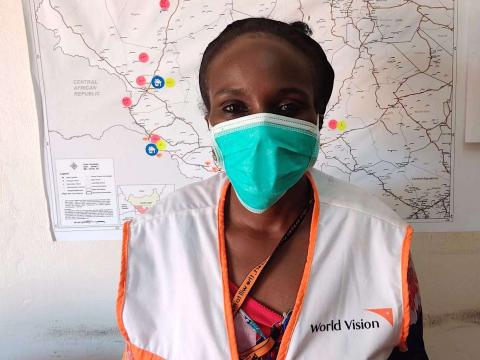Facing the odds as a woman leader in South Sudan during the COVID-19 pandemic

Being a woman humanitarian leader in a male-dominated environment is challenging enough. If you add this along with the Covid-19 global pandemic, it adds to the list of one's toughest experiences.
I had been in a number of responses such as flooding, mudslides, cholera outbreak, Marburg outbreak, among many others. But nothing had prepared me for this global outbreak quite completely. It was something that seemed so far and distant, yet it came alive even in the far-flung corners of Western Equatoria State in South Sudan.
Leading a team of over 130 staff, I remember with dread when the first rumor was heard that a case had been confirmed in the county. At that time, the information about prevention measures was not yet available.

The grapevine was buzzing with unverified information especially in social media. My biggest fear was the possibility of shutting down our humanitarian work and being unable to provide services to the vulnerable children that we serve.
Amid all these, on top of my mind was the welfare of my team being frontline workers. Thus, I made sure to preposition for medical care just in case the hospitals and clinics get overwhelmed with patients. Caregivers need to be protected.
When the government advisory for the lock down in the country happened, it felt like we were living in a surreal world. The zone is an hour by UN flight from the capital city Juba, and it felt strange to be disconnected.
As the information became available from the World Health Organization and the Ministry of Health, we did our best to intensify the awareness campaign.
One of the most difficult times we faced was when the teams have to stay in remote field locations for over four months without visiting their families due to the lockdown. Their families took it very hard.
But I could sense and see the fear in the eyes of the team. When the office task force was formed, we focused on messages of hope and prevention. While many of the people that had been tested of coronavirus got well, we emphasized that it was not a reason to be careless.
I believe that because I am a woman, I also acted as very meticulous leader in making sure everything was in place. I was both strategic yet very nurturing.
Our workspaces have an ample supply of hand-washing and prevention resources to keep everyone safe. We even made sure door handles and frequently-used facilities we cleaned up thoroughly.
One of the most difficult times we faced was when the teams have to stay in remote field locations for over four months without visiting their families due to the lockdown. Their families took it very hard. The children could not understand why their parents could not go home.

Every day was a race for us to encourage each other, reminding each one that the whole world is affected by the lock down and feeling sorry for ourselves would not do us any good.
Responding to this pandemic made me reflect on these skills:
- Agility – The ability to make quick decisions due to changing programmes and yet ensure that the decisions are safe and will not expose the teams to further risk.
- Negotiation – As an implementing partner who has to keep work operations running for the sake of people we serve, being able to negotiate with authorities to allow us to continue with lifesaving activities and demonstrate that we can do them safely.
- Resilience – the ability not just to bounce back, but also to do it quickly and move forward.
As a woman leader, I did my best to show strength as I led the team while making them feel I care for them and their families. Had I shown fear, I would have spread that, too.
By Enid K. Ocaya, Zonal Programme Manager, Western Equatoria Zone, World Vision South Sudan